#Walter Pater
Text
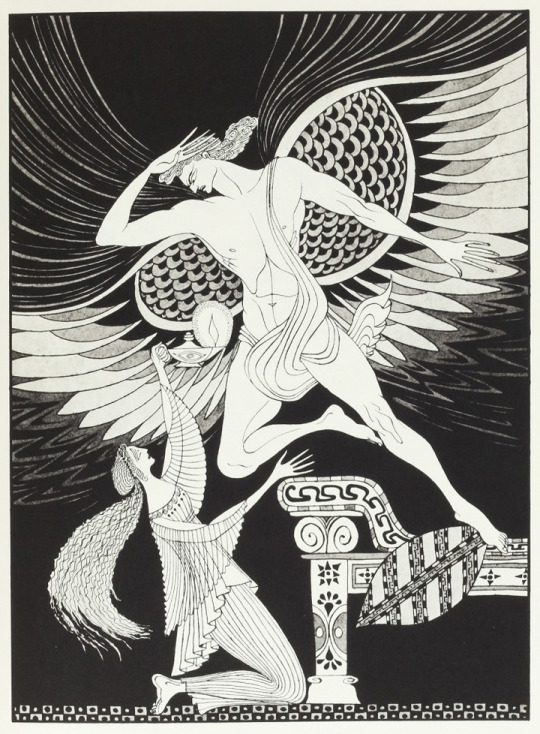
Errol Le Cain (1941-1989), ''Cupid and Psyche'' by Walter Pater, 1977
Source
131 notes
·
View notes
Text

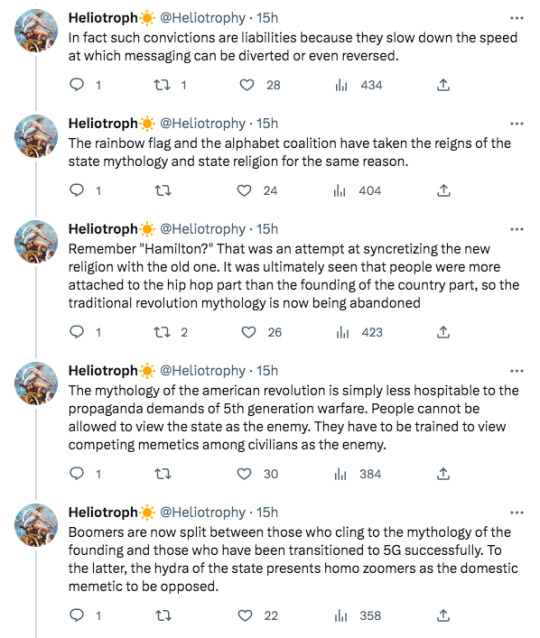

I hope Tumblr can forgive the piquant way these Twitter anons phrase some things, because the above mapping is basically correct, except that the phenomenon mapped is bigger than America's recent generational divides—bigger, in fact, than America. I give you, for example, the peroration of an article by friend-of-the-blog Nancy Armstrong. The article was published in 2001, before social media and when the Zoomers were still in the cradle. Armstrong's polemical target is Richard Rorty, whom she likens to the Victorian English liberals Mill and Arnold, seeing all three as panicked by the encroachment of popular heterogeneity upon the sphere of a unified national culture, whether late-19th-century English culture or late-20th-century American culture. For the purposes of anon's framing, Rorty (b. 1931) is a Boomer and Armstrong (b. 1938) is a Zoomer, but, as you see from the dates, that can't be right. What anon takes to be American Zoomer ideology goes back at least to the first Late Victorians who rebelled against Arnold (Mill/Arnold = Boomers; Pater/Wilde = Zoomers), themselves the distant founders of our queer politics defined by the separation of sign (gender) from referent (body), which, as anon rightly says, have become the power politics of empire today in a world-historical incidence of what I have in a narrower but related circumstance traced as the path "from counterculture to hegemony."
In our present cultural milieu, it is even less practical to believe that the cultural turn can be reversed by detaching politics from culture and restoring the mimetic priorities of old-fashioned realism than to long for the aesthetic autonomy of New Criticism or look for hope in the inspirational works of our literary tradition. To come to this conclusion is to admit that any responsible political action rests on understanding the degree to which the world we inhabit actually depends on the way that we read and represent the things and people in it. Changing an established world picture is an admittedly monumental task that may well begin and end in the literary classroom. But precisely because our Victorian forebears were so successful in establishing their picture of the world as the world itself, the fantasy that one can remake one’s culture through criticism is not only a legacy that they bequeathed to us. That fantasy also offers an effective means of displacing the picture of a world divided into homogeneously populated nations that our Victorian forebears worked so hard to put in place. The crises that arise when that old ideal of the nation is severely challenged do not disrupt or threaten American culture. Our culture is a culture in crisis, and some of us like it that way.
—Nancy Armstrong, "Who's Afraid of the Cultural Turn?" differences: A Journal of Feminist Cultural Studies, 12.1 (2001)
#nancy armstrong#richard rorty#cultural studies#cultural criticism#john stuart mill#matthew arnold#walter pater#oscar wilde#literary theory
8 notes
·
View notes
Text
“[Walter] Pater’s Madonna seems burdened by her knowledge of the profound difference that Christ’s birth will make. Pater suggests that Mary is saddened in particular by the inevitability of her own deification as a result of having borne the Son of God. As he describes the infant Christ guiding his mother’s hand to trace out the words of the Marian Liturgy, Pater suggests that the Virgin was exalted against her will...
What is depressing to Pater, it seems to me, about the moment of her glorification is that it entails the forgetting of her life of obscurity and servitude. Once God looks on her humiliation, it is transformed into glory: as if magically, her shame is transmuted into pride. Pater suggests that if such a deification means erasing the record of one’s life on earth, it might be better to resist it.”
Heather Love, Feeling Backward: Loss and the Politics of Queer History
14 notes
·
View notes
Quote
For the essence of humanism is that one belief of which he seems never to have doubted, that nothing which has ever interested living men and women can wholly lose its vitality—no language they have spoken, no oracle by which they have hushed their voices, no dream which has once been entertained by actual human minds, nothing about which they have ever been passionate or expended time and zeal.
Walter Pater, from ‘Pico della Mirandola’ in The Renaissance: Studies in Art and Poetry.
16 notes
·
View notes
Text
Walter Pater sent Oscar Wilde a letter saying, "I was at home sick and when I read your story. I loved it. It really comforted me at a time when I was in pain." Thank you Mr. Pater. That was exactly what happened to me, so thank you for your ability to premonish my life experiences and for your letter to Mr. Wilde telling him exactly what I want to tell him now.
#literature#oscar wilde#walter pater#aestheticism#decadence#letter#letter to the past#stories#writers#writers on tumblr#written#poets and writers#spilled thoughts#spilled writing#spilled poetry#writers and poets#sad prose
2 notes
·
View notes
Text
i fucking love walter pater's run-on sentences
"At Thebes alone," says Sophocles, "mortal women bear immortal gods." His mother is the daughter of Cadmus, himself marked out by many curious circumstances as the close kinsman of the earth, to which he all but returns at last, as the serpent, in his old age, attesting some closer sense lingering there of the affinity of man with the dust from whence he came. Semele, an old Greek word, as it seems, for the surface of the earth, the daughter of Cadmus, beloved by Zeus, desires to see her lover in the glory with which he is seen by the immortal Hera. He appears to her in lightning. But the mortal may not behold him and live.
Semele gives premature birth to the child Dionysus; whom, to preserve it from the jealousy of Hera, Zeus hides in a part of his thigh, the child returning into the loins of its father, whence in due time it is born again. Yet in this fantastic story, hardly less than in the legend of Ariadne, the story of Dionysus has become a story of human persons, with human fortunes, and even more intimately human appeal to sympathy; so that Euripides, pre-eminent as a poet of pathos, finds in it a subject altogether to his mind. All the interest now turns on the development of its points of moral or sentimental significance; the love of the immortal for the mortal, the presumption of the daughter of man who desires to see the divine form as it is; on the fact that not without loss of sight, or life itself, can man look upon it. The travail of nature has been transformed into the pangs of the human mother; and the poet dwells much on the pathetic incident of death in childbirth, making Dionysus, as Callimachus calls him, a seven months' child, cast out among its enemies, motherless. And as a consequence of this human interest, the legend attaches itself, as in an actual history, to definite sacred objects and places, the venerable relic of the wooden image which fell into the chamber of Semele with the lightning-flash, and which the piety of a later age covered with plates of brass; the Ivy- Fountain near Thebes, the water of which was so wonderfully bright and sweet to drink, where the nymphs bathed the new-born child; the grave of Semele, in a sacred enclosure grown with ancient vines, where some volcanic heat or flame was perhaps actually traceable, near the lightning-struck ruins of her supposed abode.
10 notes
·
View notes
Quote
A book, like a person, has its fortunes with one; is lucky or unlucky in the precise moment of its falling in our way, and often by some happy accident counts with us for something more than its independent value.
Walter Pater, Marius the Epicurean
2 notes
·
View notes
Text

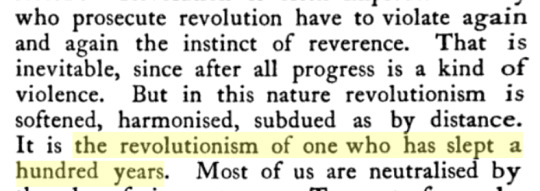

the sugarcubes, "traitor" / walter pater, "diaphaneité"
2 notes
·
View notes
Text
youtube
We're in Hell "What White Noise Tells Us About The Mona Lisa" (2023)
Entertaining video essay that discusses the history of Leonardo da Vinci's "Mona Lisa", the experience of viewing it as a painting, and the experience of viewing it as an iconic image (aided by the ideas of Don Delillo and Walter Benjamin).
#mona lisa#leonardo da vinci#musee du louvre#art history#don delillo#postmodernism#vincenzo peruggia#we're in hell#walter pater#walter benjamin#art#louvre museum#video essay#video#2023
0 notes
Text
"Livros são umas espécie de refúgio claustral, das vulgaridades do mundo de hoje."
Walter Pater (1839-1894)
0 notes
Text
With him the beginning of life has all the characteristics of resurrection: it is like the recovery of suspended health or animation, with its gratitude, its effusion, its eloquence.
-Walter Pater on Michelangelo, in The Renaissance (1873)
#walter pater#michelangelo#renaissance#art#birth#resurrection#recovery#renewal#rebirth#creativity#creation
0 notes
Text
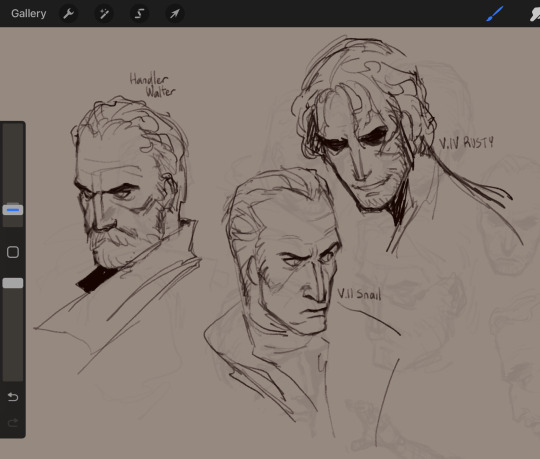

Just starting my NG++ run
#the game of all time#ac6#armored core 6#armored core vi#handler walter#v.ii snail#v.iv rusty#621#knart#oc#i like my 621 but ive gotta put more thought into them#a freak for sure#i wanna try designing more!! i like these npcs so much#michigan and pater and freud and ayre and#so many#ill have plenty of time to draw after i beat ng++#sketch
582 notes
·
View notes
Text
Walter: Got a job for you, 621. This request comes from Schneider, a subsidiary of Arque—
Pater: Raven! Raven. You gotta help us. Those wokies on Xitter they’re, they’re… the cancel culture. Cancel culture! Those snowflakes are… Our brand! Our tags are flooded, all of our posts… K-Kill them! Raven, you have to—!
Walter: Fuck off. Disregard, 621.
108 notes
·
View notes
Text
the fact that someone out there is doing the Lord's work
making a dating same based on Armored Core 6
a mecha game.
what is happening.
I'm all for it---
I found my hyperfixation like-
the designs the artist made
I literally started supporting her on Patreon if she'll not make this game I'll die
her designs had me like
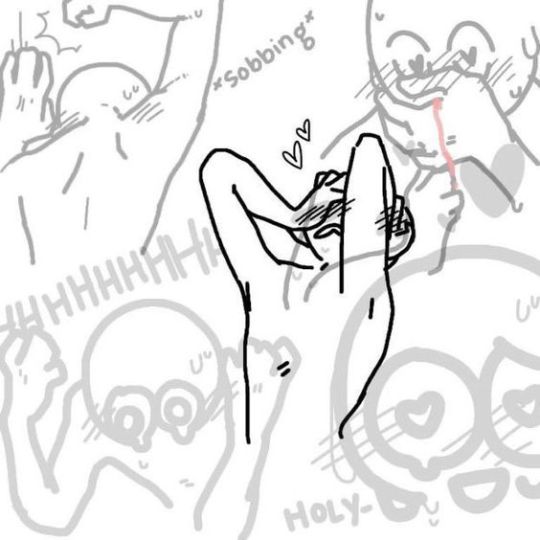
why are they not real omg
like
look at them
Rusty's so
wow
on my knees my lord-
Iguazu looks so emo tsundere bf
Walter is daddy shaped
And the WOMEN make me gay
Materlinck is the definition of my taste in women
Snail looks like a cuck I love him too
BRUTE???? PATER??? zAMN
#armored core 6#amour'd core#I love this#hyperfixation#i'm a simp#g5 iguazu#v.ii snail#v.viii pater#Rusty is so#i'm so normal about him#handler walter#ayre armored core#ayre#allmind#original post
24 notes
·
View notes
Quote
A counted number of pulses only is given to us of a variegated, dramatic life. How may we see in them all that is to seen in them by the finest senses? How shall we pass most swiftly from point to point, and be present always at the focus where the greatest number of vital forces unite in their purest energy?
To burn always with this hard, gemlike flame, to maintain this ecstasy, is success in life. In a sense it might even be said that our failure is to form habits: for, after all, habit is relative to a stereotyped world, and meantime it is only the roughness of the eye that makes any two persons, things, situations, seem alike.
Walter Pater, from ‘Conclusion’ in The Renaissance: Studies in Art and Poetry.
“While all melts under our feet, we may well grasp at any exquisite passion, or any contribution to knowledge that seems by a lifted horizon to set the spirit free for a moment, or any stirring of the senses, strange dyes, strange colours, and curious odours, or work of the artist’s hands, or the face of one’s friend [...] With this sense of the splendour of our experience and of its awful brevity, gathering all we are into one desperate effort to see and touch, well shall hardly have time to make theories about the things we see and touch.”
“Theory, hypothesis, beliefs depend a great deal on temperament; they are, so to speak, mere equivalents of temperament.” (from Chapter XX in Marius the Epicurean)
1 note
·
View note
Text
In all these instances, then, Dionysus punishes his enemies by repaying them in kind. But a deeper vein of poetry pauses at the sorrow, and in the conflict does not too soon anticipate the final triumph. It is Dionysus himself who exhausts these sufferings. Hence, in many forms—reflexes of all the various phases of his wintry existence—the image of Dionysus Zagreus, the Hunter—of Dionysus in winter—storming wildly on the dark Thracian hills, from which, like Ares and Boreas, he originally descends into Greece; the thought of the hunter concentrating into itself all men's forebodings over the departure of the year at its richest, and the death of all sweet things in the long-continued cold, when the sick and the old and little children, gazing out morning after morning on the dun sky, can hardly believe in the return any more of a bright day. Or he is connected with the fears, the dangers and hardships of the hunter himself, lost or slain sometimes, far from home, in the dense woods of the mountains, as he seeks his meat so ardently; becoming, in his chase, almost akin to the wild beasts—to the wolf, who comes before us in the name of Lycurgus, one of his bitterest enemies—and a phase, therefore, of his own personality, in the true intention of the myth. This transformation, this image of the beautiful soft creature become an enemy of human kind, putting off himself in his madness, wronged by his own fierce hunger and thirst, and haunting, with terrible sounds, the high Thracian farms, is the most tragic note of the whole picture, and links him on to one of the gloomiest creations of later romance, the werewolf, the belief in which still lingers in Greece, as in France, where it seems to become incorporate in the darkest of all romantic histories, that of Gilles de Retz.
Greek essays, Walter Pater
9 notes
·
View notes